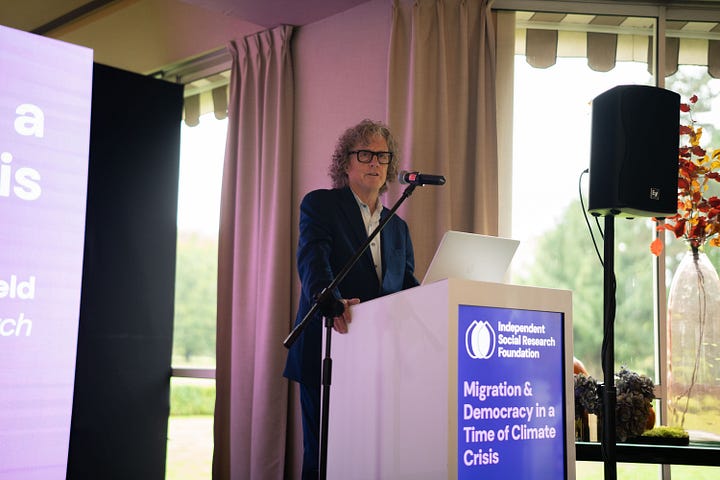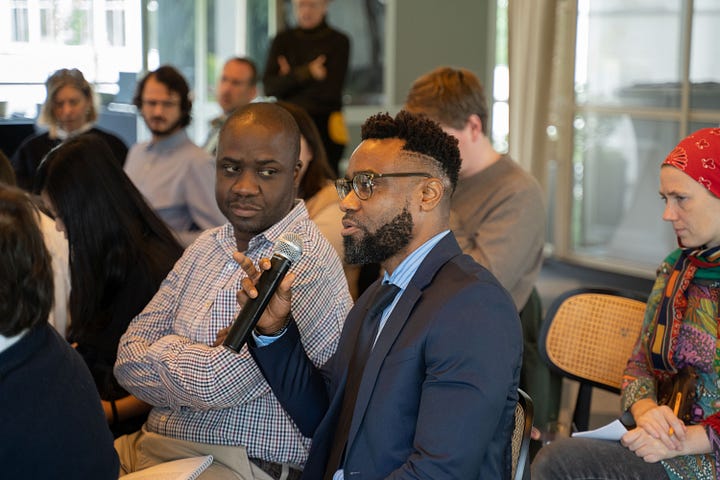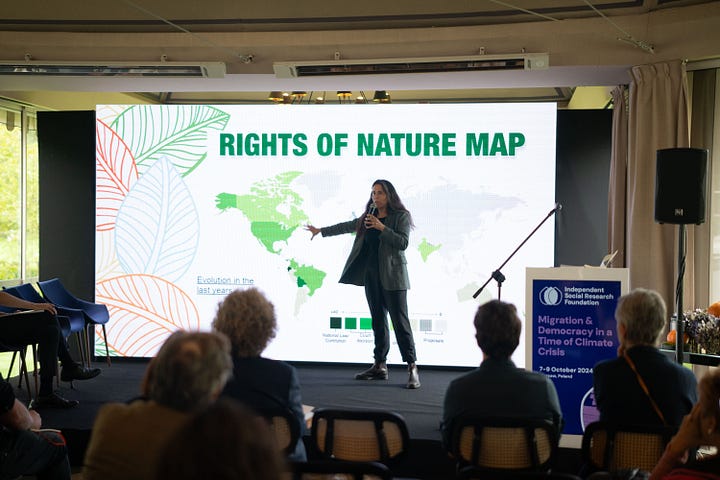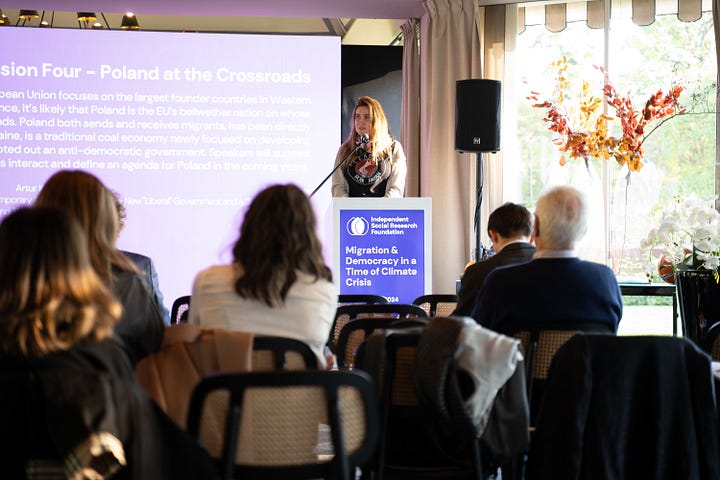ISRF Bulletin 31: Migration Myths and Realities
This ISRF Bulletin brings together a number of papers presented at the ISRF’s 2024 conference, 'Migration and Democracy in a Time of Climate Crisis'.
This ISRF Bulletin brings together a number of papers presented at the ISRF’s 2024 conference.
Editorial
Dr Lars Cornelissen, ISRF Academic Editor
Today there are few topics that are the subject of such widespread, frenzied, and wanton mythmaking as immigration. The favourite wedge topic of far-right insurgent movements, for some decades now immigration has served as the linchpin of an exclusionary nationalism that is rapidly gaining electoral ground all over the world. This process has been facilitated by meek centrist parties who, more afraid of left-wing gains than of their own rightward drift, have excelled at normalising increasingly extremist rhetoric.
Decades of right-wing agitation, scare-mongering, and disinformation, and the centrist facilitation thereof, has ensnared public discourse on the theme of migration in a hopelessly tangled mythscape. Under these conditions sober analysis or informed judgement is increasingly difficult, hampered by a media ecosystem much of which is calculated to amplify scapegoating.
This does not mean, of course, that sober analysis is either impossible, futile, or hopeless. Indeed, sound research and rigorous theory building remain key ingredients in the struggle against extremist drift.




It was precisely in the spirit of sober analysis that, in October 2024, the ISRF gathered a few dozen scholars in Warsaw for a conference on the theme of migration. Intent on pushing back against dominant myths and their harmful effects, speakers discussed the realities of migration, focussing on the causes and impacts of migration, its patterns and trends, its affects and geographies, its lived experience and representation. This issue of the Bulletin collects six of the papers that were presented in Warsaw. It will be followed, later in the year, by a second issue containing papers on other themes discussed during the conference.
The issue opens with an introductory piece by Christopher Newfield, the ISRF’s Director of Research, recounting his main takeaways from the Warsaw conference.
The first contribution, by Michael Nwankpa, forcefully argues that European military intervention in the Sahel has worsened democratic backsliding in the region by propping up dictatorial regimes and kindling anti-Western sentiment in local populations. A key cause of this dynamic, he argues, is that European powers are motivated to intervene not out of a desire to restore order to the region but due to domestic pressures to curb immigration flows from Africa to Europe. Here the real damage caused by migration myths becomes starkly apparent: fear-mongering in Europe translates to authoritarian consolidation in parts of Africa.
Aurea Mota’s contribution shows that migration myths are structured around a reified and short-sighted conception of the nation state, leaving no room for a broader conception of the natural environment. She explores the affordances and limits of a theory of nature rights, which would configure Gaia as a subject of rights as a way of both achieving environmental justice and demythologising migration.
Eric Kushinga Makombe, in his contribution, returns our focus to Africa as he documents key findings from a recent study in Zimbabwe’s Chipinge district. There, most migration flows are forms of internal displacement, caused by corporate land grabs that have seen entire communities uprooted from their ancestral land. This form of internal migration intersects with the ever-worsening impacts of climate change to constitute a deep social, demographic, and environmental crisis.
Rebecca Yeo’s thoughtful piece brings together disability activism and migrant activism, arguing that both movements are oriented towards similar goals and have much to learn from one another. Reporting on a recent art project undertaken with disabled people based in Bristol, Yeo draws out key insights from the disabled people’s movement in the fight to achieve justice on multiple fronts.
In her contribution, Theresa Audrey O. Esteban discusses the history and geography of Rotterdam’s most migrant-heavy neighbourhoods. She explores how, historically, migration flows into the Netherlands mapped onto shifting demand in the labour market before becoming the target of right-wing political campaigning. She ends with an impassioned plea for researchers to rise to the ethical and political challenges of their work.
The final piece of this issue is by Joanna Klimowicz, our guest speaker at the Warsaw conference. She reports on her harrowing experiences on the frontline of the Polish-Belarussian border, where refugees from Africa and the Middle East are facing exceedingly dangerous conditions. Seeking to render aid to refugees caught up in the ‘push back’ fiasco, she ended up bearing witness to an unfolding humanitarian crisis that will forever be a stain on Europe’s moral consciousness.
Featuring contributions from Michael Nwankpa, Aurea Mota, Eric Kushinga Makombe, Rebecca Yeo, Theresa Audrey O. Esteban, and Joanna Klimowicz.

